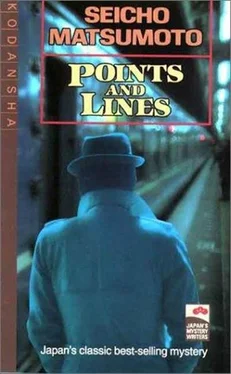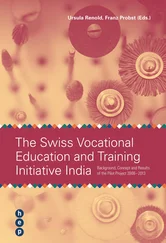Seichō Matsumoto - Points And Lines
Здесь есть возможность читать онлайн «Seichō Matsumoto - Points And Lines» весь текст электронной книги совершенно бесплатно (целиком полную версию без сокращений). В некоторых случаях можно слушать аудио, скачать через торрент в формате fb2 и присутствует краткое содержание. Жанр: Детектив, на английском языке. Описание произведения, (предисловие) а так же отзывы посетителей доступны на портале библиотеки ЛибКат.
- Название:Points And Lines
- Автор:
- Жанр:
- Год:неизвестен
- ISBN:нет данных
- Рейтинг книги:5 / 5. Голосов: 1
-
Избранное:Добавить в избранное
- Отзывы:
-
Ваша оценка:
- 100
- 1
- 2
- 3
- 4
- 5
Points And Lines: краткое содержание, описание и аннотация
Предлагаем к чтению аннотацию, описание, краткое содержание или предисловие (зависит от того, что написал сам автор книги «Points And Lines»). Если вы не нашли необходимую информацию о книге — напишите в комментариях, мы постараемся отыскать её.
Points And Lines — читать онлайн бесплатно полную книгу (весь текст) целиком
Ниже представлен текст книги, разбитый по страницам. Система сохранения места последней прочитанной страницы, позволяет с удобством читать онлайн бесплатно книгу «Points And Lines», без необходимости каждый раз заново искать на чём Вы остановились. Поставьте закладку, и сможете в любой момент перейти на страницу, на которой закончили чтение.
Интервал:
Закладка:
Mihara stared at him. He realized that while he was in Hokkaido invisible currents had been eddying around the chief. Yet Inspector Kasai, after all, was only one of the figures in the investigation.
"We didn't have much luck there either," Kasai stated bluntly. "Tatsuo Yasuda apparently visits his wife once a week. So it's more than likely that he has affairs with other women. But there's no evidence of this. If he does have a mistress, he's very clever about keeping it a secret. This is merely an assumption, of course; Yasuda may be a faithful husband. They seem to be a devoted couple."
Mihara nodded. This had been his impression also when he called on Mrs. Yasuda.
"It would appear that Otoki, Sayama and Yasuda, if he does have a mistress, are all very skillful at keeping their love affairs secret."
His words struck Mihara forcibly. What had been only a slight hint suddenly became clear.
"Chief, has there been some new development?" He tried to suppress his excitement.
"Yes," Chief Kasai replied. "The section chief has become interested in this double suicide!"
Mihara knew at once what this signified. The section chief was being subjected to pressure from higher up.
Mihara's surmise was correct, Inspector Kasai admitted.
When Mihara came into the office the following day the chief called him over to his desk.
"I want you to hear this. Ishida sent us a message." He placed his arms on the desk, his hands clasped. It was a typical gesture when perplexed. "He didn't come in person. He sent someone from the ministry. Ah, here's the man's card."
The visiting card read: "Kitarō Sasaki, Official of X Ministry." Mihara looked at it, waiting for the chief to speak.
"Ishida said that he had been questioned the other day about Tatsuo Yasuda and when he found that the interrogation originated with the Metropolitan Police Board he decided to present his statement to us directly. He said that on his official trip to Hokkaido on January 20, Yasuda was on the same train. They were in different coaches but Yasuda dropped by to talk to him from time to time. If we want this corroborated we can question Katsuzō Inamura, an official of the Hokkaido government, who joined him in his coach some time after Otaru. Inamura was on the train from Hakodate, and when Yasuda came to say goodbye, before getting off at Sapporo, he introduced the two men. Inamura would undoubtedly remember the meeting. That's the gist of his statement."
"He really went out of his way to protect Yasuda, didn't he?" Mihara observed.
"You can look at it that way, of course. But perhaps he wanted simply to cooperate with the police when he found we were investigating him." The chief was smiling. The meaning of the smile did not escape Mihara.
"What do you suppose the relations between Ishida and Yasuda are?"
"One is a government official, the other a manufacturer doing business with the government. I leave the connection to your imagination. Just remember that Ishida is the principal suspect in the government bribery case. However, we have found nothing between them that is suspicious. Of late, Yasuda has been doing a good deal of business with that ministry, so I am quite sure he has been giving presents to the division chief. Ishida's willingness to protect Yasuda may be in return for these favors." The chief was pulling his fingers until the joints cracked.
"Even so, even if true, there's little we can do. As a matter of course, I sent a wire to Hokkaido for confirmation of Ishida's statements, but I expect nothing new in the reply. What it all amounts to is that Yasuda was not lying when he said he was on the Marimo on January 21."
One more witness to testify that Yasuda was on the Marimo! Mihara returned to his desk, deeply discouraged.
It was past noon. Mihara went up to the dining hall on the fifth floor of the Metropolitan Police Board building. The room was the size of a small department store restaurant. Sunlight poured in through the tall windows. Mihara had no appetite. He ordered a cup of tea and while sipping it, started to write in his notebook:
Yasuda's trip to Hokkaido:
His signature on the passenger register of the Sei-kan ferry. (No. 17. Connects with the Marimo at Hakodate.)
Division Chief Ishida's statement.
After passing Otaru, Ishida introduced a Hokkaido government official to Yasuda.
Yasuda met Kawanishi at Sapporo Station.
Deep in thought, Mihara sat staring at his memo. The four items looked irrefutable; they were like four concrete blocks placed one on top of the other. But they must be toppled, he decided. They absolutely had to be pulled down. How could the express Satsuma, leaving Hakata in Kyushu at 7:24 on the twenty-first possibly be connected with the express Marimo arriving at Sapporo at 8:34 the same day. It was impossible. Impossible of course, meant that it could not be. But, but… Tatsuo Yasuda did actually appear at Sapporo Station in Hokkaido. Holding his head in both hands, Mihara looked at his memo for the tenth time. Then, suddenly, he noticed something strange.
The train had passed Otaru when Inamura of the Hokkaido government was said to have been introduced to Yasuda. Yasuda was reported to have come from another coach to say goodbye to Ishida. Wasn't it curious that he should put in an appearance only after the train had passed Otaru Station? Ishida, Inamura and Yasuda boarded the Marimo at Hakodate but occupied different coaches. Why did Inamura get to meet Yasuda only after they had passed Otaru? Hadn't Yasuda called on Ishida from time to time during the journey?
Mihara took the timetable from his pocket. He saw that it took five hours by express from Hakodate to Otaru. Yasuda was on intimate terms with the division chief; surely he would not have avoided him during those five hours. Why didn't Yasuda ride in the same coach with Ishida and spend the time chatting with him? Of course it could have been diffidence on Yasuda's part, but there was no reason for not calling on him once during those five hours.
Inamura was a disinterested witness. He said he had met Yasuda for the first time after the train had passed Otaru. Could it be that Tatsuo Yasuda had boarded the Marimo at Otaru station?
The question flashed through Mihara's mind. If true, it would explain why they had met only after passing Otaru. It would also explain why Yasuda claimed to be in a different coach: he didn't want it known that he had come aboard at Otaru. He appeared before Ishida and Inamura as soon as the train pulled out of Otaru station, leaving Inamura with the impression he had been aboard since Hakodate.
Mihara thought he saw a ray of light piercing the gloom that had enveloped him. Something was vaguely taking shape. His heart beat faster.
But Yasuda could not have boarded the express at Otaru.
To do so, he would have to leave Hakodate on an earlier train than the Marimo in order to reach Otaru in time. With the available train connections, this was not possible.
But the thought that Yasuda might have gotten on at Otaru made Mihara pursue it further. It was hard to believe; he was not ready to accept it, but he felt there was something to the possibility. He finished his cup of tea that was now quite cold and left the dining hall. His mind was in a turmoil and he walked down the stairs in a daze.
Why did Yasuda get on the Marimo at Otaru station? Why should he want to get on at Otaru? Mihara kept turning the question over and over in his mind. If Yasuda did get on at Otaru, then he must have taken a train that left before the Marimo. The earlier train was the Akashiya, leaving Hakodate at 11:39. Still earlier were two local trains and an express which left at 6 A.M. But all of these were completely out of the question, of course.
To Mihara, Yasuda had to be situated at the scene of the double suicide in Kyushu between the hours of 10 and 11 on the night of the twentieth. He would look for the reasons later; Yasuda simply had to be there. But in order to get to Hokkaido from Hakata there was only the one express to Tokyo the following morning, leaving at 7:24. No matter which way he looked at it he encountered the same dead end.
Читать дальшеИнтервал:
Закладка:
Похожие книги на «Points And Lines»
Представляем Вашему вниманию похожие книги на «Points And Lines» списком для выбора. Мы отобрали схожую по названию и смыслу литературу в надежде предоставить читателям больше вариантов отыскать новые, интересные, ещё непрочитанные произведения.
Обсуждение, отзывы о книге «Points And Lines» и просто собственные мнения читателей. Оставьте ваши комментарии, напишите, что Вы думаете о произведении, его смысле или главных героях. Укажите что конкретно понравилось, а что нет, и почему Вы так считаете.












